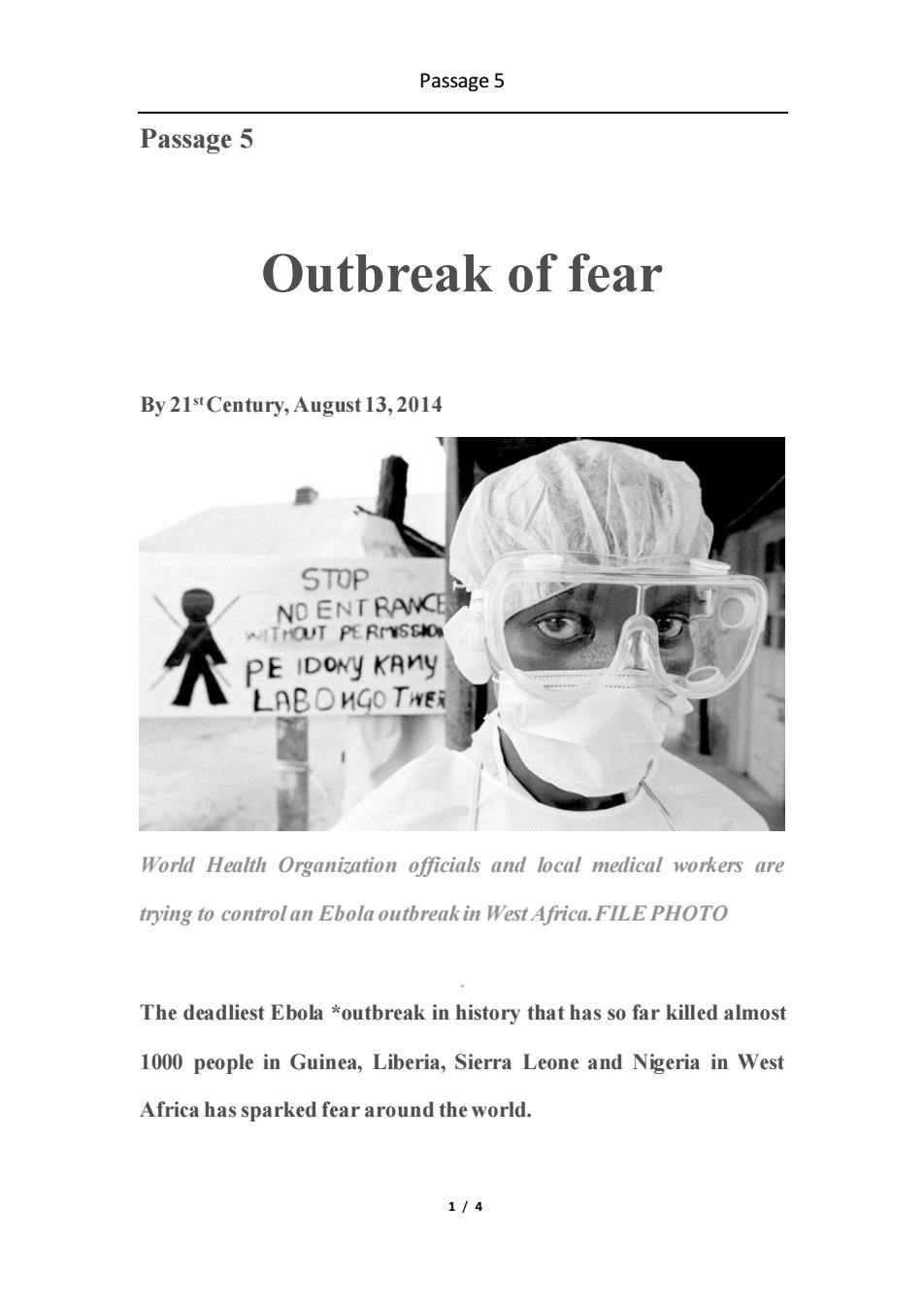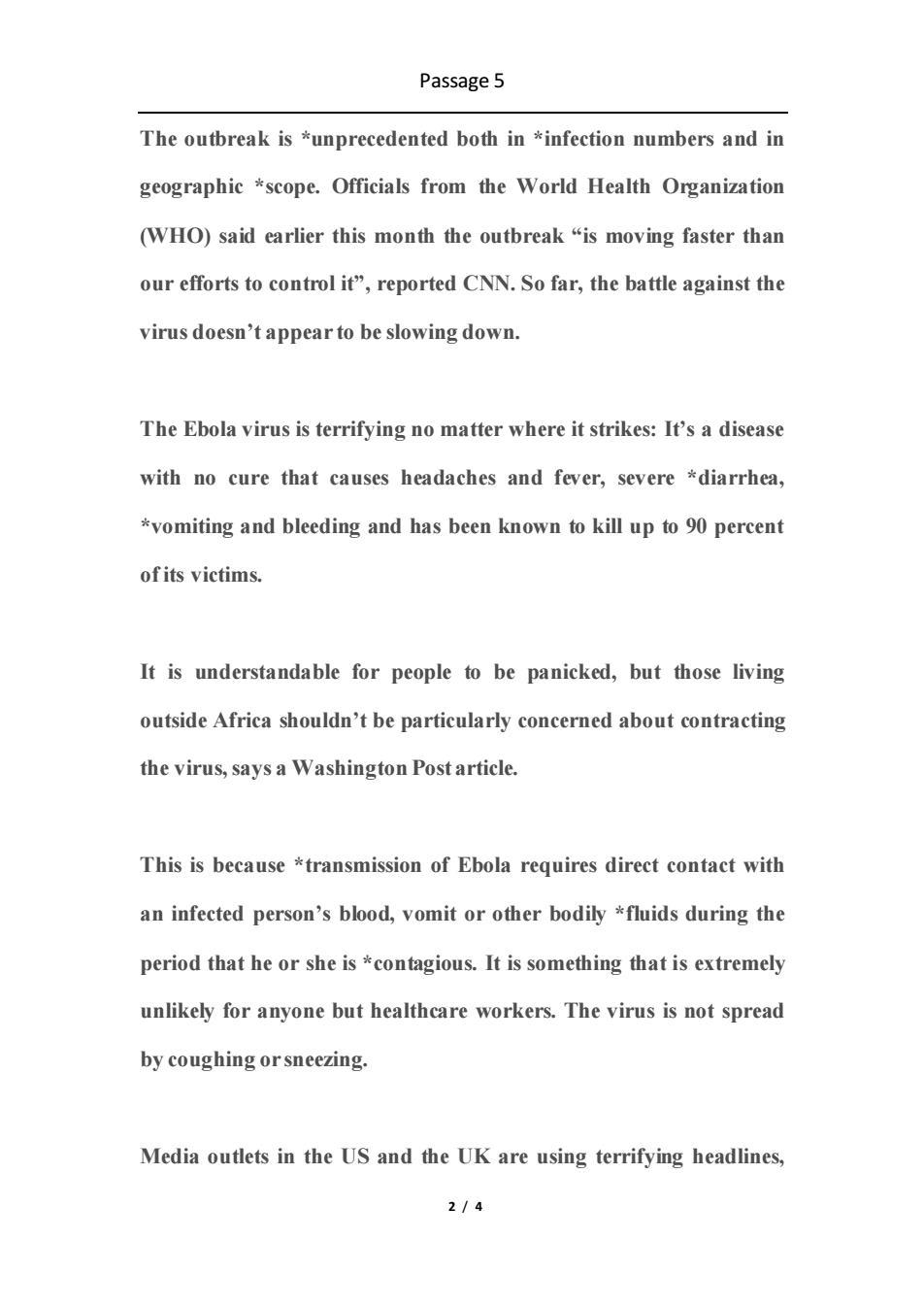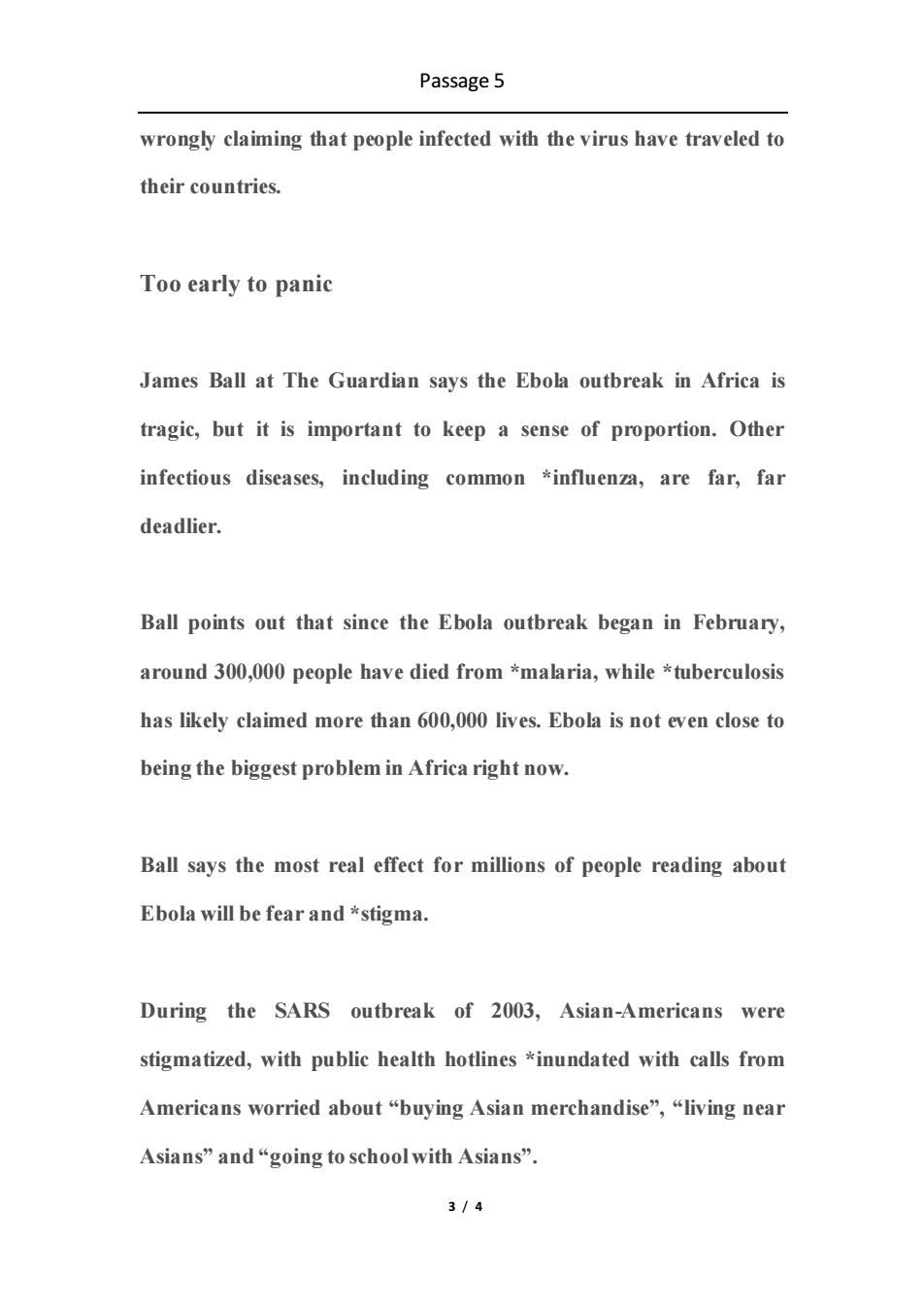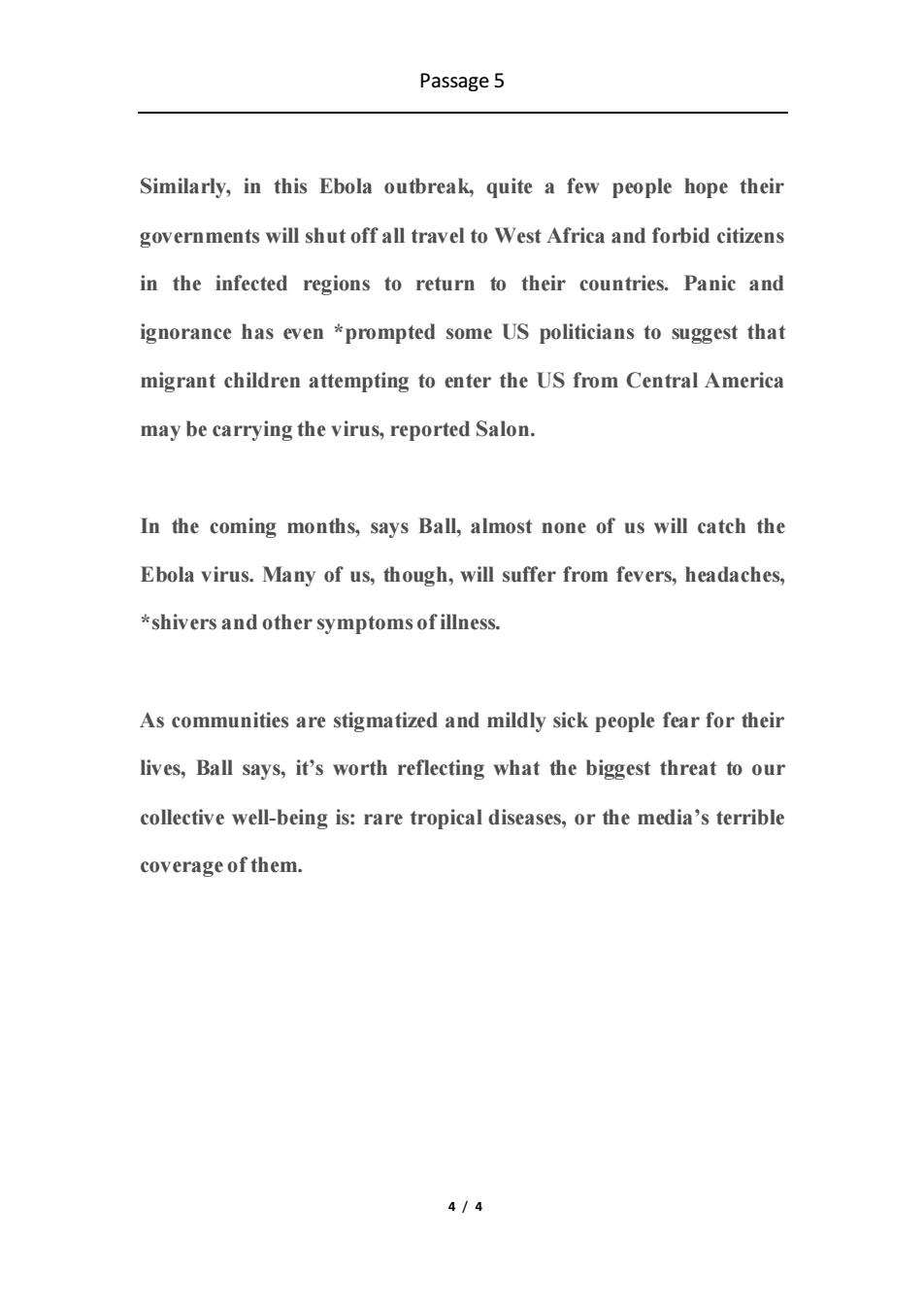
Passage5 Passage 5 Outbreak of fear By 21s Century,August 13,2014 STOP NO ENT RANCE THOUT PE RrYSSHO PE IDONy KAMy LABOHGO TWER World Health Organization officials and local medical workers are trying to control an Ebola outbreak in West Africa.FILE PHOTO The deadliest Ebola *outbreak in history that has so far killed almost 1000 people in Guinea,Liberia,Sierra Leone and Nigeria in West Africa has sparked fear around the world. 114
Passage 5 1 / 4 Passage 5 Outbreak of fear By 21st Century, August 13, 2014 World Health Organization officials and local medical workers are trying to control an Ebola outbreak in West Africa.FILE PHOTO The deadliest Ebola *outbreak in history that has so far killed almost 1000 people in Guinea, Liberia, Sierra Leone and Nigeria in West Africa has sparked fear around the world

Passage5 The outbreak is *unprecedented both in *infection numbers and in geographic *scope.Officials from the World Health Organization (WHO)said earlier this month the outbreak"is moving faster than our efforts to control it",reported CNN.So far,the battle against the virus doesn't appear to be slowing down. The Ebola virus is terrifying no matter where it strikes:It's a disease with no cure that causes headaches and fever,severe *diarrhea, *vomiting and bleeding and has been known to kill up to 90 percent of its victims. It is understandable for people to be panicked,but those living outside Africa shouldn't be particularly concerned about contracting the virus,says a Washington Post article. This is because *transmission of Ebola requires direct contact with an infected person's blood,vomit or other bodily *fluids during the period that he or she is *contagious.It is something that is extremely unlikely for anyone but healthcare workers.The virus is not spread by coughing or sneezing. Media outlets in the US and the UK are using terrifying headlines 214
Passage 5 2 / 4 The outbreak is *unprecedented both in *infection numbers and in geographic *scope. Officials from the World Health Organization (WHO) said earlier this month the outbreak “is moving faster than our efforts to control it”, reported CNN. So far, the battle against the virus doesn’t appear to be slowing down. The Ebola virus is terrifying no matter where it strikes: It’s a disease with no cure that causes headaches and fever, severe *diarrhea, *vomiting and bleeding and has been known to kill up to 90 percent of its victims. It is understandable for people to be panicked, but those living outside Africa shouldn’t be particularly concerned about contracting the virus, says a Washington Post article. This is because *transmission of Ebola requires direct contact with an infected person’s blood, vomit or other bodily *fluids during the period that he or she is *contagious. It is something that is extremely unlikely for anyone but healthcare workers. The virus is not spread by coughing or sneezing. Media outlets in the US and the UK are using terrifying headlines

Passage 5 wrongly claiming that people infected with the virus have traveled to their countries. Too early to panic James Ball at The Guardian says the Ebola outbreak in Africa is tragic,but it is important to keep a sense of proportion.Other infectious diseases,including common *influenza,are far,far deadlier. Ball points out that since the Ebola outbreak began in February, around 300,000 people have died from *malaria,while *tuberculosis has likely claimed more than 600,000 lives.Ebola is not even close to being the biggest problem in Africa right now. Ball says the most real effect for millions of people reading about Ebola will be fear and *stigma. During the SARS outbreak of 2003,Asian-Americans were stigmatized,with public health hotlines *inundated with calls from Americans worried about“buying Asian merchandise'”,“living near Asians'”and“going to school with Asians'”. 314
Passage 5 3 / 4 wrongly claiming that people infected with the virus have traveled to their countries. Too early to panic James Ball at The Guardian says the Ebola outbreak in Africa is tragic, but it is important to keep a sense of proportion. Other infectious diseases, including common *influenza, are far, far deadlier. Ball points out that since the Ebola outbreak began in February, around 300,000 people have died from *malaria, while *tuberculosis has likely claimed more than 600,000 lives. Ebola is not even close to being the biggest problem in Africa right now. Ball says the most real effect for millions of people reading about Ebola will be fear and *stigma. During the SARS outbreak of 2003, Asian-Americans were stigmatized, with public health hotlines *inundated with calls from Americans worried about “buying Asian merchandise”, “living near Asians” and “going to school with Asians

Passage 5 Similarly,in this Ebola outbreak,quite a few people hope their governments will shut off all travel to West Africa and forbid citizens in the infected regions to return to their countries.Panic and ignorance has even *prompted some US politicians to suggest that migrant children attempting to enter the US from Central America may be carrying the virus,reported Salon. In the coming months,says Ball,almost none of us will catch the Ebola virus.Many of us,though,will suffer from fevers,headaches, *shivers and other symptoms of illness. As communities are stigmatized and mildly sick people fear for their lives,Ball says,it's worth reflecting what the biggest threat to our collective well-being is:rare tropical diseases,or the media's terrible coverage of them. 414
Passage 5 4 / 4 Similarly, in this Ebola outbreak, quite a few people hope their governments will shut off all travel to West Africa and forbid citizens in the infected regions to return to their countries. Panic and ignorance has even *prompted some US politicians to suggest that migrant children attempting to enter the US from Central America may be carrying the virus, reported Salon. In the coming months, says Ball, almost none of us will catch the Ebola virus. Many of us, though, will suffer from fevers, headaches, *shivers and other symptoms of illness. As communities are stigmatized and mildly sick people fear for their lives, Ball says, it’s worth reflecting what the biggest threat to our collective well-being is: rare tropical diseases, or the media’s terrible coverage of them